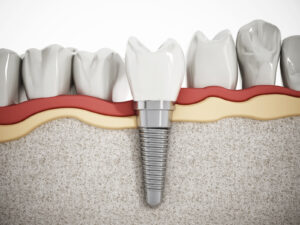
Dental Implants 101
 When you’re experiencing pain from a damaged or infected tooth, you typically have one top priority: to feel better quickly. Your dental team will likely recommend one of two treatment pathways for you at this point. You will either have to undergo a root canal treatment to save your natural tooth, or if your natural tooth is too damaged to save, you may have to get a tooth extraction and a dental implant.
When you’re experiencing pain from a damaged or infected tooth, you typically have one top priority: to feel better quickly. Your dental team will likely recommend one of two treatment pathways for you at this point. You will either have to undergo a root canal treatment to save your natural tooth, or if your natural tooth is too damaged to save, you may have to get a tooth extraction and a dental implant.
Dental implants represent one part of a treatment spectrum that endodontists are qualified to perform, and root canals are located at the other end of this spectrum. Because patients frequently want to retain their natural teeth and associate endodontists only with root canals, it’s useful to review how dental implants fit into the endodontic treatment picture.
Dental Implants in Endodontic Treatment
- Implants are artificial devices that substitute for individual human teeth. A dental implant has three parts: a fixture, which acts as an artificial tooth root; an abutment, which supports and secures the dental work place on top of it; and a restoration, a crown or other dental prosthesis that “stands in” for the extracted natural tooth.
- Many factors come into play when choosing between a dental implant and root canal treatment. This is a decision that must be made on a case-by-case basis. A patient’s overall health, the health of his or her gums and jawbone, how many other natural teeth the patient currently has (and what shape they are in), and how many treatment “steps” a successful outcome would require are all important aspects that must be taken into account. While both treatments have a high overall success rate (greater than 90 percent), selecting the wrong treatment for a patient can lead to another future treatment intervention.
- Dental implants can be installed if a root canal fails and the natural tooth must be extracted, but not vice versa. If it is not immediately clear which treatment choice to make, endodontists and your entire treatment team will take into account the permanence of implants and will proceed with treatment planning and sequencing accordingly.
“Endodontists are familiar with dental implants, and they see them in the perspective of all they know about preserving natural teeth,” says Dr. Jacqueline S. Allen, an endodontist in practice with the Phoenix Endodontic Group. “They are particularly skilled in assessing the best course of treatment for a compromised tooth.”


 When a client visits an endodontist’s office with an infected or damaged tooth, most of the time, the practitioner is able to save the natural tooth. However, sometimes this isn’t possible, and then it is necessary to extract the tooth and replace it with a dental implant.
When a client visits an endodontist’s office with an infected or damaged tooth, most of the time, the practitioner is able to save the natural tooth. However, sometimes this isn’t possible, and then it is necessary to extract the tooth and replace it with a dental implant.